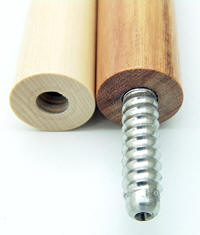Looking to buy a Schmelke Sneaky Pete, R040. There are choices for the joint. Which is best, and why?
I must confess the #7 appeals to me, surgical steel into wood threads, relatively fast thread at 8TPI, wood to wood shaft to butt contact. But I really don't know much about this, and what the selection criteria are.
(BTW, there's a contradiction on the Schmelke site, the joint description for #7 on the cue page says 8TPI, but on the joint page it says 16TPI.)
https://schmelkecue.com/billiard-cues/schmelke-cues/r040-cocobola-4-prong.html
https://schmelkecue.com/joint-styles.html

Thanks,
jv
I must confess the #7 appeals to me, surgical steel into wood threads, relatively fast thread at 8TPI, wood to wood shaft to butt contact. But I really don't know much about this, and what the selection criteria are.
(BTW, there's a contradiction on the Schmelke site, the joint description for #7 on the cue page says 8TPI, but on the joint page it says 16TPI.)
https://schmelkecue.com/billiard-cues/schmelke-cues/r040-cocobola-4-prong.html
https://schmelkecue.com/joint-styles.html

Thanks,
jv